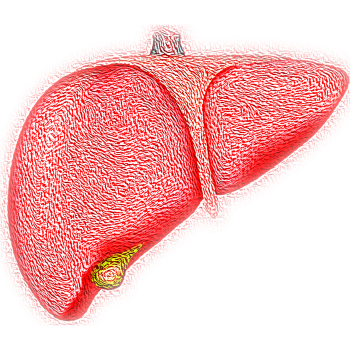Feeling Stressed? It Might Be Your Liver Calling

Liver disease can be a direct cause of mental health symptoms because a compromised liver cannot prevent toxins in the blood from reaching the brain.
FAB RESEARCH COMMENT:
This article from 'Psychology Today' merits reading in full - as it includes some simple summary slides explaining why liver health is so critical to brain health. The author, Dr Thomas Rutledge is both a Professor of Psychiatry and qualified health psychologist, specialising in the treatment of chronic medical conditions including heart disease, obesity, chronic pain, and diabetes.Fatty Liver Disease - a Modern-Day Epidemic caused by excess sugar
The classic cause of 'fatty liver disease' used to be alcoholism, and traditionally, this condition was seen only in adults whose alcohol intake had been excessive for many years.
Over recent decades, however, so-called 'Non-Alcoholic Fatty Liver Disease' (NAFLD) has become commonplace - affecting 1/3 of the US population - and occuring not just in younger adults, but even in children and adolescents. By 2020, NAFLD was already affecting around 10% of the US paediatric general population (albeit with no initial obvious signs or symptoms), and at least 40% of those with obesity.
This relentless rise in fatty liver disease follows the major dietary shift from the late 1970s and early 1980s towards ultraprocessed foods rich in sugar and refined carbohydrates - and especially fructose, which (unlike glucose) is primarily processed in the liver, where it is turned to fat.
Together with insulin resistance (also primarily caused by chronic excessive sugar intakes) an abnormal accumulation of fat in the liver forms part of the 'metabolic syndrome' that precedes the development of Type 2 diabetes and obesity.
Having a fatty liver leads to chronic, systemic inflammation - as does obesity - so the combination typically creates a vicious spiral of inflammation, oxidative stress and chronic ill health.
Why Liver Health affects Brain Health
As this article explains, the chronic ill health that a fatty liver promotes also includes poor brain health, and an array of mental as well as physical symptoms - because the liver is responsible for innumerable basic metabolic functions that include dealing with all kinds of internal and external toxins, as well as constantly processing, recycling and producing nutrients and enzymes to keep all other systems and organs working.
And all of these functions start to become compromised when the liver itself becomes fatty and inflamed.
The pioneering medical doctor, endocrinologist and pediatric obesity specialist Dr Robert Lustig was the first to really flag that 'sugar is the alcohol of the child' - and (building on earlier work by other pioneering researchers such as John Yudkin), to link the dramatic rise in our consumption of sugar, and particularly fructose, to the epidemic of obesity, Type 2 diabetes and other chronic, non-communicable diseases that has taken place since the 1980s. See:
His most recent book 'Metabolical' provides a comprehensive account of how diets rich in ultra-processed foods (high in sugar, unhealthy fats and artificial additives) are the primary cause of most of the chronic, degenerative diseases that are undermining public health worldwide - and in his concise summary of how to reduce and reverse such diseases involves two simple recommendations:
- 'Heal your liver', and
- 'Feed your gut'
A well-balanced, 'real food' diet that provides all essential nutrients - together with the dietary fibre needed to support a healthy and diverse balance of gut microbes - will allow the liver to heal and regenerate, so that it can do its essential 'cleaning and housekeeping' jobs efficiently, and support gut, immune and brain health.
Another key issue is to minimise exposure to environmtal toxins (which includes some artificial food additives and chemcials used in some food packaging, as well as tobacco, alcohol or other 'recreational' drugs and many medications) - because these increase the burden of processing the liver has to do, and can also promote inflammation and 'oxidative stress', and damage the integrity of the gut lining.
For further information please see:
08/04/2023 - Psychology Today
---------------------------------------
Key points
The liver and mental health.
Concentration, memory, mood stability, and the ability to tolerate and respond to stress are just a few of the potential mental capacities that can be impaired when toxins begin accumulating in the brain. Sadly, fatty liver disease remains a silent epidemic in the U.S., with most people unaware of the signs, symptoms, or causes3.
Healthy liver, healthy mind. What to do?
Summary
References
1. Labenz C, Huber Y, Michel M, et al.. Nonalcoholic fatty liver disease increases the risk of anxiety and depression. Hepatol Commun. 2020;4:1293–301.
2. Soto-Angona Ó, Anmella G, Valdés-Florido MJ, De Uribe-Viloria N, Carvalho AF, Penninx BWJH, Berk M. Non-alcoholic fatty liver disease (NAFLD) as a neglected metabolic companion of psychiatric disorders: common pathways and future approaches. BMC Med. 2020 Oct 1;18(1):261. doi: 10.1186/s12916-020-01713-8.
3. Ghevariya V, Sandar N, Patel K, Ghevariya N, Shah R, Aron J, Anand S. Knowing What's Out There: Awareness of Non-Alcoholic Fatty Liver Disease. Front Med (Lausanne). 2014 Mar 24;1:4. doi: 10.3389/fmed.2014.00004.
